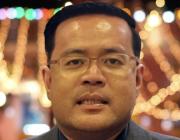|
Luis H. Francia and Eric Gamalinda have skillfully put together an anthology that clearly shows there is something which all Filipino writers hold in common, something which transcends language, politics, socioeconomic background, and religious upbringing. Aside from their mastery, of English, what they hold in common is their turbulent, understandably ambivalent relationship with America and Americans. What readers will read in the short short stories and poems written by these Filipino writers is a moving and shattering account of their angst, experiences, and impressions of what life as they have seen and lived it is like.
The works of these writers show this constant struggle to make their mark in American society. This struggle sometimes ends in triumph and often in tragedy, but the thrill is in the quest. As promised by the editors, "The readers will find familiar figures - the greedy Marcoses, teen-age gangs, game shows, rock star clones - as well as characters and themes of every stripe and hue, from gay youngsters checking out surfer jocks in Hawaii to Westernized girls coming out of convent school." Ultimately, the works of these writers - as they search for their identity and the good life - "give a unique and vivid perspective of America as well."
The old reliables - viz., Bienvenido Santos, N. V. M. Gonzales, F. Sionil Jose, Linda Ty-Casper, Ninotchka Rosca, and Jessica Hagedorn - write hugely entertaining stories without sacrificing their literary integrity. The others, of lesser stature, do not fail to impress either. M. Evelina Galang's story "Her Wild American Self" illustrates the conflict that arises between a young girl, Augustina, and her family when she is forced to adopt the sense and sensibility of a Filipina, although she has lived in America almost all her life and closely identifies with this society's beliefs and values. This is an old cultural clash that resonates over generations of immigrant families. Aside from a rare lapse in diction ("But Bernadette [the Saint] didn't give a f... what they thought"), Galang's tale is a good read. The other short stories are superior in craftsmanship, but Galang's has a plot I find intriguing.
Then there are the poems. The poems have, in Carlos Bulosan's words, "the fresh smell of the morning when papayas are in bloom." One must be "dumb and mute as a globed fruit" (Archibald MacLeish) not to hear and see the pure lyricism in Bulosan's "The Living Hour": "Whenever we are bound to each other / We are boundless. We hear angel words . . . / And I expect you to unfold like a budding rose, / And you expect me to fall like a soft star." A self-taught writer, Bulosan supported himself by working on the farm. His short stories are classics in Philippine literature. More than any other Filipino, he exemplifies the genius of a born writer.
Another Carlos (Angeles) has apparently been blessed with Bulosan's gifts. He has written two collections of poetry, A Stun of Jewels and Bruise of Ashes (1993). In "Jacaranda Trees" he displays a kinship with Bulosan in his understanding of the power and purity of nouns and verbs: "At nightfall, phantom emperors and kings / walk the earth around the block / their footfalls treading the flooded streets / of bruised blue and purple colors." Edith L. Tiempo, Rene Amper, Peter Bacho, Jose Capili, Mafia Carino, and the incomparable Fatima Lira-Wilson are included to remind us all of what reading good poetry, feels like. And read Luis Cabalquinto, Jose Capili, and Ricardo Ungria carefully. You will be immensely rewarded if you do.
As competent as this anthology is, the editors stumble here and there in their choices. Joel B. Tan's "Night Sweats" is a sad example. Tan is a good writer, but his lurid story, of a self-destructive young gay couple has neither any redeeming social value nor the power to uplift the human spirit to offset the explicit language. Without either quality, the tale borders on pornography and would only add to the existing prejudice against the gay community. Nick Carbo's two poems on Ang Tunay Na Lalaki (The Real Man), notably the one on the man who realizes he is below average (in genital size), suffers from the same flaws. Both Tan and Carbo are too gifted and versatile to be wasting their time on such drivel.
All in all, one could write a dissertation on this fine collection of short stories and poems; but for sheer pleasure, lie in bed, pull up the covers, prop up your pillows, and let these authors take you places both magical and real.
Al Camus Palomar University of Oklahoma
Review Grade: A

